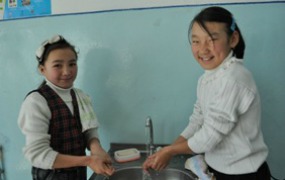
RVF helped ensure that 4.5 million individuals received deworming treatment and hygiene education between 2008-2012. During 2013-2014, while the Ministry of Health of the Kyrgyz Republic stepped up to continue deworming treatment of its population, RVF was actively involved in the training of laboratory technicians and parasitologists in modern intestinal helminth survey and diagnostic techniques including Kato-Katz as well as protocols to explore the link between the Hymenolepis nana parasite and anemia.
Details of the completed deworming campaign can be found below:
- Goal: Reduce the burden of soil-transmitted helminth infections in the general population, especially children, and strengthen preventive activities against re-infection
- Beneficiaries: 4.5 million individuals
- Location: Nationwide in Kyrgyzstan
- Timeline: 2008- 2012
- Partners:
- Ministry of Health (MOH) of Kyrgyzstan
- United States Department of Defense
- United States Department of State
- Sustainability: By January 2013 the Kyrgyz government has financed 100% of the total cost of continuing the annual deworming of school-aged children.
The Rostropovich-Vishnevskaya Foundation (RVF) carried out a nationwide deworming program in Kyrgyzstan in 2008-2012. The national campaign benefited a total of 4.5 million children and adults. Crucial financial and technical support was provided by the United States Department of Defense through the Transit Center at Manas in Kyrgyzstan, as well as the U.S. Department of State.
The Kyrgyz Ministry of Health declared the deworming campaign a public health priority because of the high burden of intestinal parasites among the general population. Pre-campaign epidemiologic surveys sponsored by the RVF indicated parasite burdens of over 50% among adults and children. Offending pathogens included Enterobius, Ascaris, and Trichuria. These intestinal worms cause children to suffer from reduced growth rates, learning problems, poor school attendance, malnutrition and anemia.
The deworming program was a implemented entirely by Kyrgyz healthcare workers with the support of numerous community-based councils and schools. Coverage rates exceeded 90%. In addition to treatment with the deworming medication albendazole, the campaign included local capacity building by training lab specialist in modern diagnostic methods of helminthic infections, a pre-and post-treatment assessment of the worm burden across Kyrgyzstan to measure the efficacy of the campaign, and the provision of teaching materials on basic hygienic practices to teachers and parents to prevent re-infection among children.
Representatives of the Kyrgyz Ministry of Health, the U.S. Transit Center at Manas and the RVF made regular site visits to monitor and evaluate the deworming campaign. A video produced by the Transit Center at Manas during the final round of deworming in and around the capital Bishkek is available here.
The strategy underlying all of the Foundation’s health programs is to create mechanisms of sustainability by strengthening the existing health care infrastructure and avoiding the establishment of parallel structures. Kyrgyzstan assumed full financial responsibility for follow-up deworming programs in 2013.